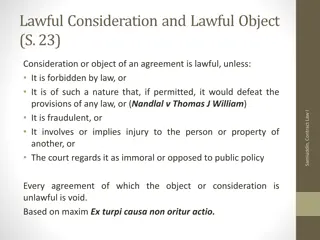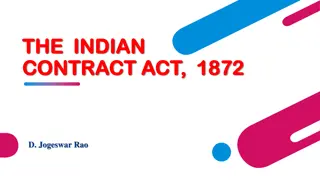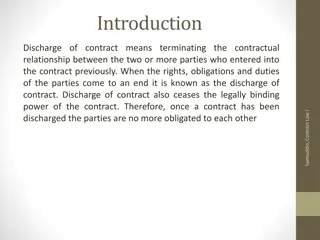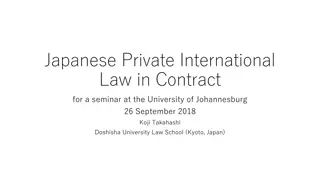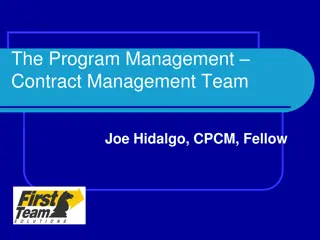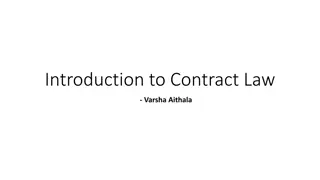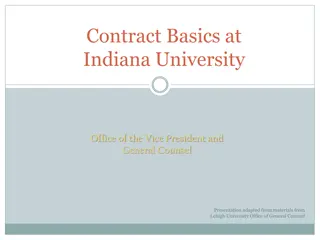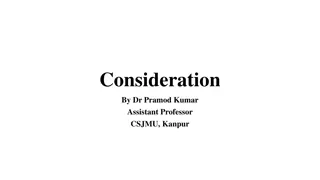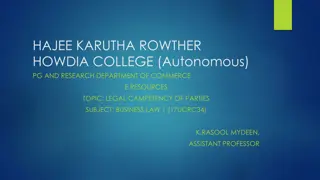Consideration in Contract Law
Explore the concept of consideration in contract law through examples and explanations. Learn what makes a promise legally enforceable, including the two-way exchange requirement and the bargain theory. Understand the importance of consideration in forming valid contracts and test your knowledge with practical scenarios.
Uploaded on Sep 18, 2024 | 0 Views
Download Presentation

Please find below an Image/Link to download the presentation.
The content on the website is provided AS IS for your information and personal use only. It may not be sold, licensed, or shared on other websites without obtaining consent from the author.If you encounter any issues during the download, it is possible that the publisher has removed the file from their server.
You are allowed to download the files provided on this website for personal or commercial use, subject to the condition that they are used lawfully. All files are the property of their respective owners.
The content on the website is provided AS IS for your information and personal use only. It may not be sold, licensed, or shared on other websites without obtaining consent from the author.
E N D
Presentation Transcript
Consideration Basics Richard Warner
What Do You Want To Learn? The black letter law How to recognize when that law applies in a given fact pattern How to use the law to create legal reasoning that solves problems.
Is This Promise Enforceable? To acknowledge your beginning the study of contract law, I promise to pay you $1. A promise is enforceable only if there is consideration for it.
The Two-Way Exchange Requirement There is consideration for a promise if (1) the promisor gave his or her promise to get a promise or performance in exchange, and (2) the promisee gave that promise or performance in return.
The Restatement On The Bargain Theory 1. A contract is a legally enforceable promise ( 1). 2. Exceptions aside, a promise is legally enforceable only when there is consideration for it ( 17(1) - (2)). 3. The consideration may be another promise or a performance ( 3, 71). 4. A promise or performance is consideration when it is "bargained for" ( 71(1)). 5. A promise or performance is bargained for "if it is sought by the promisor in exchange for his promise and is given by the promisee in exchange for that promise" ( 71(2)).
A Correct Statement? The following is a correct statement of the bargain theory of consideration: A promise or performance is bargained for if it is sought by the promisor in exchange for his promise, or is given by the promisee in exchange for that promise. (A)True. (B) False.
A Car For Law School When Alice s parents found out she got into Chicago-Kent, they said, Alice, in consideration of your achievement, we promise to buy you a car. Is the promise legally enforceable? (a) Yes (b) No (c) Not sure.
Dougherty v. Salt Facts Aunt Tillie promised in a promissory note to pay her nephew Charley $3000 because he was a good boy and was doing well in school. She wanted to take care of him. Charley gave nothing to Aunt Tillie in return for the promise.
What Did Aunt Tillie Do? Did she give her promise to get a promise or performance in exchange from Charley? a) Yes b) No
What Did Charley Do? Did he give a promise or performance in return for Aunt Tillie s promise? a) Yes b)No
Executory Gift Judge Cardozo says: The transaction thus revealed admits of one interpretation, and one only. The note was the voluntary and unenforceable promise of an executory gift. "Executory" means "undelivered." In the United States (and common law countries generally), the promise to make a gift is legally enforceable once the gift is delivered but not before.
When Is A Promise A Promise To Give A Gift? The answer: a promise to give something for which there is no consideration. Think of "gift" in this context as a technical term just meaning promise unsupported by consideration. Don't get confused by ordinary, non-legal uses of the word.
The Role of Intent Aunt Tillie intended to legally obligate herself to give $3000 to Charley in the future. Why is this not sufficient to make her promise to give the money legally enforceable?
The Funeral Tillie s favorite brother died recently, and Tillie very much wants her nephew Charley to attend the funeral. She promises to pay him $500 if he does. Charley promises to attend and does so. However, when Tillie finds out that he had planned to attend the funeral anyway before she offered to pay $500, she refuses to pay. Under the bargain theory, is Tillie s promise enforceable? a)Yes b)No
Pleased With Results Stuart, a buyer for Germania, a garment distributor, negotiated a contract with Margaret Fashions to purchase a specified quantity of garments for a price of $1,000,000. When Perritt, president of Germania, learned of the contract, he told Stuart that he was so pleased that he would promot to general manager of Germania s buying department. Which of the following is true? (A) There is no consideration for Perritt s promise. (B) There is consideration because Perritt conferred a material benefit on Stuart. (C) There is consideration because Perritt had a moral obligation to perform as promised. (D) None of the above.
Grandpa Augustus said to his grandson Claudius . . . Claudius, you re my favorite grandchild. You ve never been a hard partier. I may not be around much longer. I d like for you to have something to remember me by. Is there anything you might like to have as a remembrance of me? Claudius said that he was fond of his grandfather s collection of antiquarian law books. Grandpa Augustus was so moved by Claudius devotion to the books that he said, I will change my will to leave you my antiquarian law books. Claudius replied. I promise I ll make you proud. Is there consideration for Augustus promise to change his will? a) No, Augustus suffered no detriment from his promise. b) No, because Claudius did not seek Augustus s promise in exchange for Augustus s promise to will the books to Claudius. c) Yes, because Augustus was morally obligated to keep his promise to Claudius.
Claudius was a hard-partying 23-year-old who, in Augustus s opinion, was too fond of drinking, gambling, and competing in video game tournaments. Grandpa Augustus promised to will his antiquarian law books to Claudius if Claudius would promise to refrain from drinking and legal gambling, and did not compete in video game tournaments for the remainder of Augustus s life. Claudius promised to refrain from drinking and gambling and promised not to compete in video game tournaments for the rest of Augustus s life. a) Yes b) No
Unusual Motivations On eBay in 2004, Britney Spear s discarded bubblegum sold for $14,000. Is the buyer s promise to pay $14,000 consideration for the seller s promise to sell at $14,000? (a) Yes (b) No
Not Inquiring into the Adequacy of Consideration From Dougherty: The inference of consideration to be drawn from the form of the note has been so overcome and rebutted as to leave no question for a jury. This is not a case where witnesses, summoned by the defendant and friendly to the defendant's cause, supply the testimony in disproof of value. Strickland v. Henry. Ordinarily, courts do not inquire into the adequacy of consideration. In plain English, they take the parties at their word.
Promising Not To Refuse Aunt Tilly promises to give some money to her nephew Charlie. Uncle Fred says that the promise will not be legally binding without consideration from Charlie. He says to have Charlie promise not to refuse to accept the money. (a) Charlie has a legal right to refuse the gift, so his promise counts as consideration for Aunt Tilly's promise. (b) Charlie's promise is a sham, an attempt to circumvent consideration doctrine. It is inadequate as consideration. (c) The money will benefit Charlie, and a benefit to the promisee is sufficient for consideration. (d) None of the above.
But In Dougherty . . . This is a case where the testimony in disproof of value comes from the plaintiff's own witness, speaking at the plaintiff's instance. The transaction thus revealed admits of one interpretation, and one only. The note was the voluntary and unenforceable promise of an executory gift. Schnell v. Nell is another case in which the court does not take the parties at their word.
Schnell v. Nell Zacharias Schnell s wife, Theresa, made a will leaving $200 each to J. B. Nell, Wedelin Lorenz, and Donata Lorenz. The will was invalid. Zacharias promised to pay each of the three $200. He got one cent in exchange for this promise. Then, Zacharias had a change of heart and refused to pay. He claimed there is no consideration for the promise.
Possible Consideration 1. A promise, on the part of the plaintiffs, to pay him one cent. 2. The love and affection he bore his deceased wife, and the fact that she had done her part, as his wife, in the acquisition of property. . . .
One Cent: The Argument A promise is enforceable only there is consideration for it. There is consideration for a promise only if the promisor gave the promise in order to get a promise for performance in exchange. [First part of the rule, but all we need here.] All Schnell really got in exchange for his promise was a penny. He could not have been seeking a penny in exchange for $600. Therefore, he did not give his promise in exchange for the penny. Therefore, there was no consideration for his promise.
What About Love and Affection? The court says: The past services of his wife, and the love and affection he had borne her, are objectionable as legal considerations for Schnell's promise, on two grounds: 1. They are past considerations. 2. The fact that Schnell loved his wife, and that she had been industrious, constituted no consideration for his promise to pay J. B. Nell, and the Lorenzes, a sum of money. . . . Nor is the fact that Schnell now venerates the memory of his deceased wife, a legal consideration for a promise to pay any third person money.
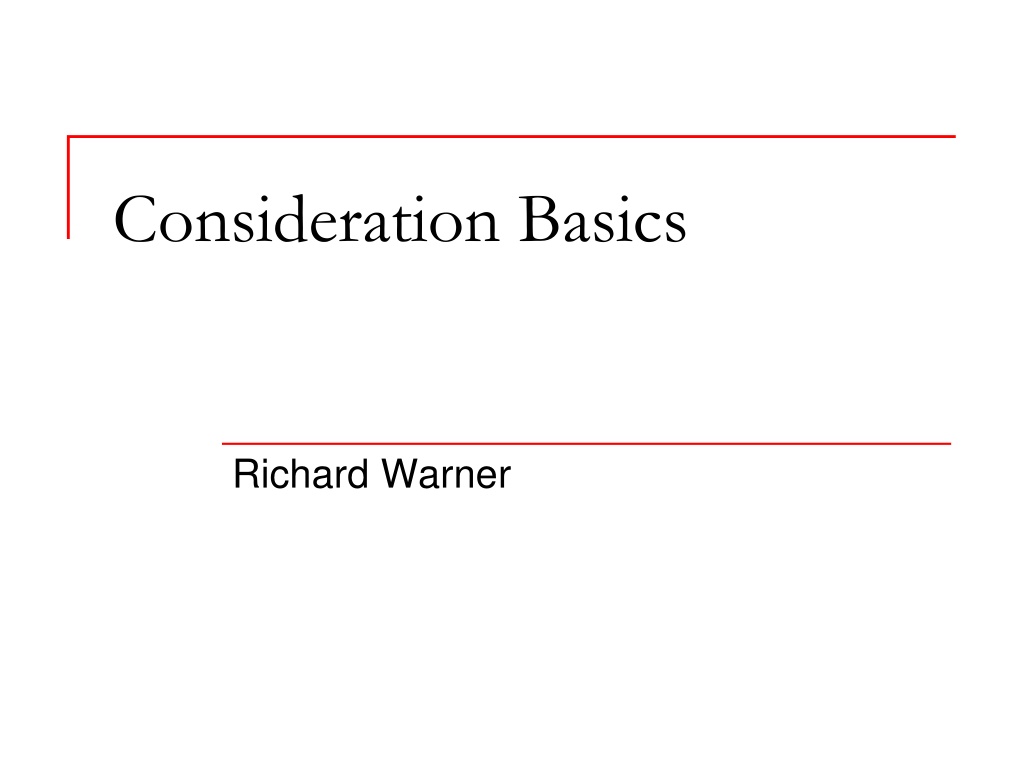
 undefined
undefined




